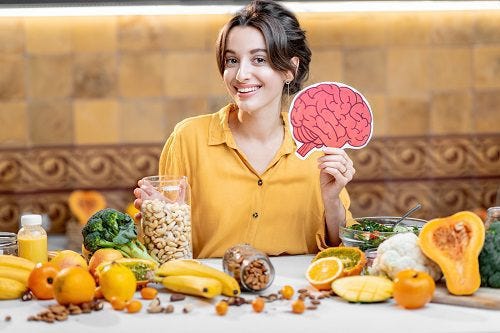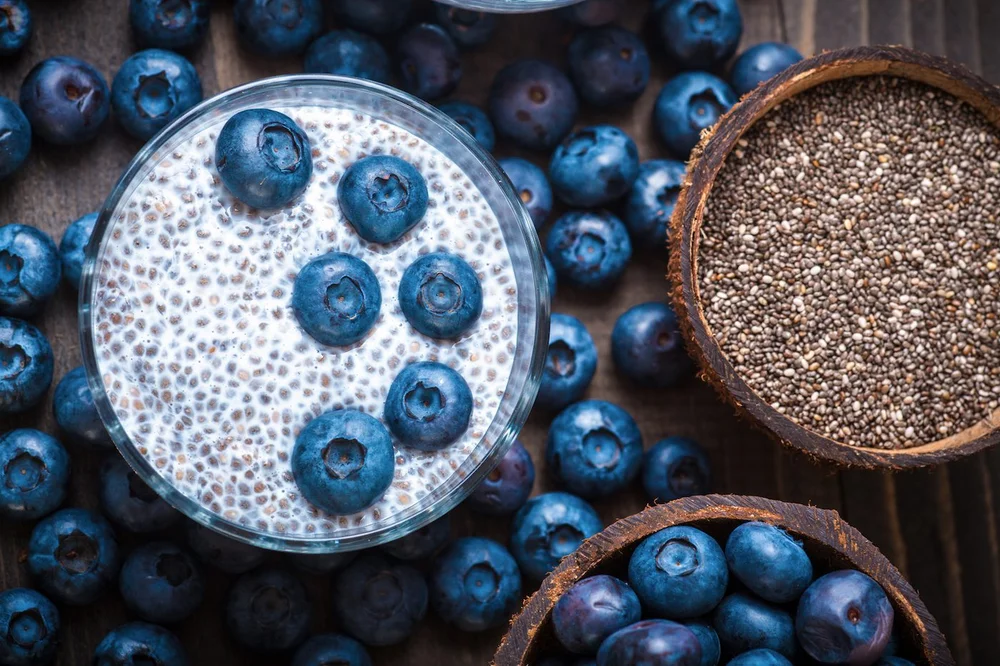5 of the Best Ways to Improve Your Diet and Brain Health
Medically Reviewed by Dr. Nicole Avena
“You are what you eat!”
Though it’s become trite from overuse, this common expression may be more accurate than you realize.
Medicine or Poison?
Food is medicine or it’s poison.
The foods you eat each day can play a vital role in your overall health. Not only can making healthier choices in your diet help control your waistline, it also can help lift your mood and provide a long-lasting boost in energy and focus.
Your brain requires specific vitamins and high-quality nutrients to use as fuel throughout the day. The foods you eat can greatly affect mood, energy, and your brain’s overall performance.
Unfortunately, in our fast-paced world, there’s an overabundance of foods that are harmful to your health.
SAD Diet
The standard American diet (SAD), or Western pattern diet (WPD), is typically filled with pro-inflammatory and allergenic foods, many of which are laced with artificial ingredients and chemicals.
The SAD diet is largely composed of unhealthy foods that Dr. Daniel Amen refers to as weapons of mass destruction. These foods are:
- Highly processed – essential nutrients lost
- Pro-inflammatory – are injurious to muscles, joints, and organs
- Artificially colored and sweetened – can tax the liver and other organs
- High glycemic index – overworks the body’s sugar processing system
- Low in fiber – robs probiotics of the food they need
- Laden with hormones – can adversely affect the body’s delicate hormone balance
- Pesticide sprayed – toxic to humans
- Tainted with antibiotics – harmful to probiotics
This diet typically is high in sodium, refined sugars, omega-6 fatty acids, trans fats, and excess calories. It’s also low in the vitally important long-chain omega-3 fatty acids, EPA and DHA.
People who maintain a diet loaded with simple carbohydrates (such as bread, pasta, potatoes, rice, fruit juices, and sugar) have an increased risk for problems with their digestive system, liver, pancreas, heart, circulation, and overall brain health.
So, is there a link between diet and brain health? Let’s look at what some researchers have discovered.
Food and Behaviors
Ongoing research suggests that food may affect our hormones and brain chemistry. Diet may be implicated in the rising incidences of mental health problems and violence in our society. For instance, in one study out of Iran, junk food was found to be associated with aggression, mood issues, sleep problems, and low self-esteem in kids.
The hopeful news is that eating a healthy diet may improve these negative behaviors and outcomes. One double-blind, randomized controlled trial found a 35% reduction in violent offenses in criminals who took omega-3 and vitamin/mineral supplements.
Since food can play such a huge role in your physical and mental well-being, it’s vital that you do everything you can to support your diet and brain health. Here are five practical diet tips that can help improve your health…
5 of the Best Natural Ways to Improve Your Diet and Brain Health
- Brain-smart Calories

But here’s another important principle; the quality of your calories matters more than the quantity. For close to the same calorie total, you can get a large soda and slice of pizza or a piece of wild salmon, Swiss chard, sweet potato, and piece of dark chocolate. The first option promotes potential health challenges, while the second option promotes good health.
- Eat from the Rainbow
Colorful plant foods have tremendous health benefits. They provide an enormous array of nutrients, vitamins, and minerals that are necessary for good health.
It’s recommended that you eat natural foods from the full spectrum of colors and flavors, such as blueberries, pomegranates, yellow squash, and red bell peppers. Eating these foods can provide power-packed flavonoids, elevate antioxidant levels in your body, and help your overall brain and body health.
Eating colorful produce also can help improve your mood. One study found a correlation between the number of fruits and vegetables a person eats and their level of happiness and life-satisfaction. Eating up to eight servings a day of fruits and vegetables can help to improve your outlook and well-being.
Be sure to adhere to the two-to-one ratio of vegetables to fruits to limit your added sugar intake.
- Don’t Drink Your Calories
Drinking water can help you lose weight by acting as an effective appetite suppressant so you’ll feel fuller and eat less. Water consumption can help prevent fluid retention; your body won’t try to retain water if it’s getting enough. Drinking a glass of water 30 minutes before a meal may help you eat less and still feel satiated.
Try to limit consumption of anything that dehydrates you, including caffeine, alcohol, and other diuretics. Replace sodas, fruit juices, and other sugary drinks with water. Since drinking water can help you remain well hydrated and can aid in weight loss, it’s recommended that you don’t drink your calories.
- High-quality Protein
It’s recommended that you eat some high-quality protein with every meal and snack (at least every 4 to 5 hours). Protein helps to balance blood sugar levels and can help to decrease cravings. You’ll most likely feel fuller longer and burn more calories when eating a protein-rich meal or snack than you will eating high-carb, sugar-filled foods.
Nuts, seeds, and legumes are good sources of protein. Many meats, including wild-caught fish and free-range poultry, are rich in protein and amino acids. Be sure to shop for animal protein that’s free of hormones and antibiotics.
- Choose Organic
Fast food, sugar, simple carbohydrates, dairy products, trans fats, excess omega-6 fatty acids and foods that are processed, engineered, or refined can promote illness and an unhealthy lifestyle. Try to reduce and eventually eliminate food additives and artificial preservatives, dyes, and sweeteners from you diet.
Whenever possible, eat organically grown or raised foods, since pesticides used in commercial farming can accumulate in your brain and body. Consult the Environmental Working Group’s annual produce report, which lists fruits and vegetables with the highest and lowest levels of pesticide residues.
Also, when you can, choose hormone-free, antibiotic-free meat from animals that are free-range and grass fed.
Love Brain-Healthy Foods
Why should you be serious about the quality of the nutrients you put in your body and the bodies of those you care about? Because you love your friends, your family, and yourself.
Though we typically don’t think of it this way, making healthy food choices is an act of love. It’s a vital way to maintain or improve your physical and mental wellness.
As we’ve seen, there seems to be a strong correlation between your diet and brain health. Eating high-quality, organic foods may help support your mood, memory, and cognition over the long haul.
Make the decision today to only love foods that love you back.
At BrainMD, we’re dedicated to providing the highest purity nutrients to improve your physical health and overall well-being. For more information about our full list of brain healthy supplements, please visit us at BrainMD.
- This Is What You Need to Know About HBOT
Medically Reviewed by Dr. Nicole Avena - April 22, 2024 - Hormone Changes in Men: How to Know If You Have Low Testosterone! - April 15, 2024
- This Is What You Need to Know About EMDR Therapy! - April 11, 2024




Great article! The one issue I have is nightshade plants (peppers and tomatoes) cause inflammation. That reduces the rainbow for me. What vitamins am I missing out on?
Thank you.
Angela